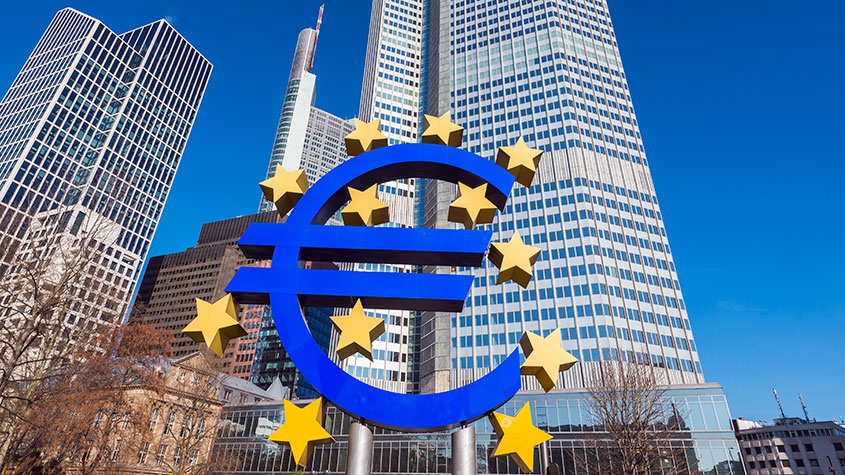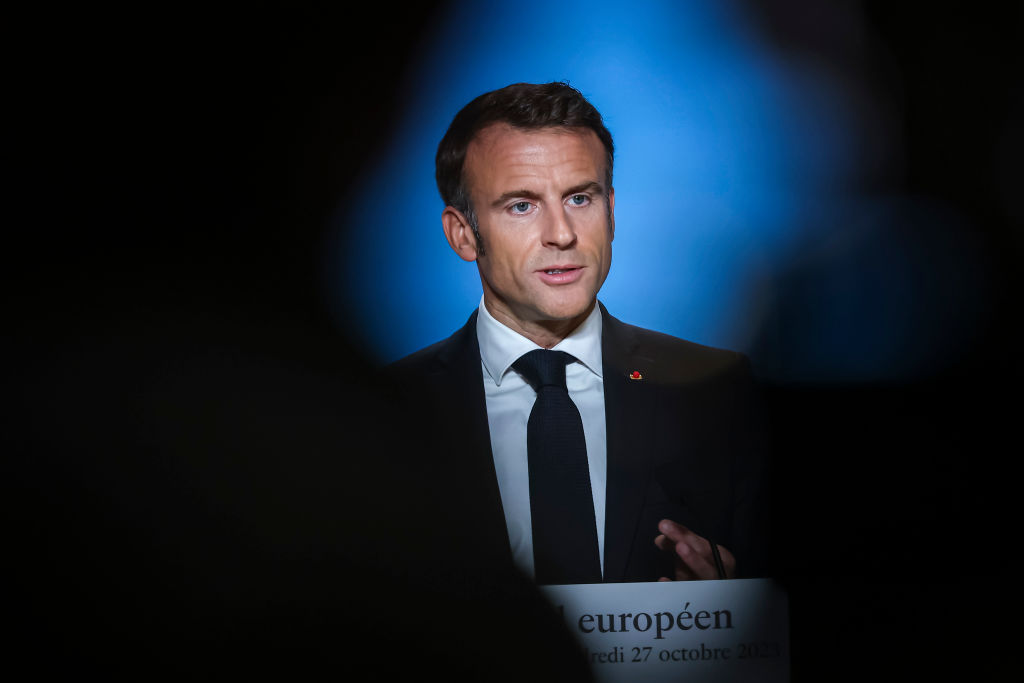Eurozone inflation hits 10.7% in October
Inflation across the eurozone hit 10.7% in October. What does it mean for your money?


Get the latest financial news, insights and expert analysis from our award-winning MoneyWeek team, to help you understand what really matters when it comes to your finances.
You are now subscribed
Your newsletter sign-up was successful
Want to add more newsletters?

Twice daily
MoneyWeek
Get the latest financial news, insights and expert analysis from our award-winning MoneyWeek team, to help you understand what really matters when it comes to your finances.

Four times a week
Look After My Bills
Sign up to our free money-saving newsletter, filled with the latest news and expert advice to help you find the best tips and deals for managing your bills. Start saving today!
Eurozone inflation jumped to a record high of 10.7% in October, outpacing analysts’ projections for an increase of 10.2% for the month. We explain what this means for your finances.
Like the UK, the EU is suffering from high energy and food prices following Russia’s invasion of Ukraine earlier in the year, which are pushing up prices of goods and services across the board.
Inflation in the UK hit 10.1% in September, rising back into double digits after a slight dip to 9.9% in August.
MoneyWeek
Subscribe to MoneyWeek today and get your first six magazine issues absolutely FREE

Sign up to Money Morning
Don't miss the latest investment and personal finances news, market analysis, plus money-saving tips with our free twice-daily newsletter
Don't miss the latest investment and personal finances news, market analysis, plus money-saving tips with our free twice-daily newsletter
UK inflation figures for October have not yet been published. Nevertheless, they are widely expected to show inflation accelerating again following the increase in the energy price cap.
What is the European Central Bank doing to control Eurozone inflation?
Double-digit inflation is putting a lot of pressure on the European Central Bank (ECB) to continue increasing interest rates.
Here in the UK, the Bank of England has been acting aggressively to raise rates in an attempt to drive down inflation. However, across the Channel, the ECB is having to be more cautious.
The EU is in an incredibly precarious economic position and the central bank is wary of going too far too fast.
But despite these concerns, the ECB has raised its leading interest rate from below 0 to 1.5%. It is expected the bank will unveil another 0.75% hike in December, taking the base rate to 2.25%.
Some analysts believe this could tip the Eurozone into a recession. A recession in the EU would ultimately be bad news for the UK economy as lower demand will have an impact on imports and exports.
A recession may also hurt the value of the euro. This may make it cheaper for holidaymakers and importers, which could be a silver lining.
Will Eurozone inflation have an impact on UK inflation?
Higher inflation in the Eurozone is hardly good news for investors and consumers here in the UK.
It could be seen as a sign of things to come as higher energy and food prices are responsible for most of the increase.
Energy prices across the Eurozone rose by 41.9% in October, from 40.7% the previous month. Meanwhile, the prices of food, alcohol and tobacco rose by 13.1%, up from 11.8% in September,
More worryingly, core inflation, which excludes volatile energy and food prices, rose 5%, up from 4.8% in September. This number suggests that inflation is becoming more entrenched in the economy and is going to become much harder to contain.
What does higher Eurozone inflation mean for you?
Higher Eurozone inflation will ultimately lead to higher interest rates in the rest of Europe. Rising prices may also force the Bank of England to go further with its planned rate rises.
This will be good news for savers who will be earning more money on their cash. However, it will be bad news for borrowers as higher interest rates will increase the cost of borrowing.
If interest rates settle at a higher level here in the UK than in the Eurozone, the pound could strengthen in value against the euro.
That means holidaymakers may be able to get more for their money when travelling to the EU.
A stronger pound may also help reduce inflation here in the UK.
Unfortunately, rising prices across the EU may not mean much for most people in the UK, but it is going to have an effect here.
The EU is the UK’s biggest trading partner and higher prices will feed into exports from the region. That might mean higher prices for consumers here in the UK. With wages already lagging behind inflation, it seems negative real wage growth is going to continue.
Remember to get your tickets for the MoneyWeek Wealth Summit hosted by Merryn Somerset Webb, on 25 November 2022! – we’ve got some brilliant speakers lined up and, given everything that’s going on, we’ll have an awful lot to talk about.
Book your place now at moneyweekwealthsummit.co.uk
Get the latest financial news, insights and expert analysis from our award-winning MoneyWeek team, to help you understand what really matters when it comes to your finances.

Rupert is the former deputy digital editor of MoneyWeek. He's an active investor and has always been fascinated by the world of business and investing. His style has been heavily influenced by US investors Warren Buffett and Philip Carret. He is always looking for high-quality growth opportunities trading at a reasonable price, preferring cash generative businesses with strong balance sheets over blue-sky growth stocks.
Rupert has written for many UK and international publications including the Motley Fool, Gurufocus and ValueWalk, aimed at a range of readers; from the first timers to experienced high-net-worth individuals. Rupert has also founded and managed several businesses, including the New York-based hedge fund newsletter, Hidden Value Stocks. He has written over 20 ebooks and appeared as an expert commentator on the BBC World Service.
-
 Reach for the stars to boost Britain's space industry
Reach for the stars to boost Britain's space industryopinion We can’t afford to neglect Britain's space industry. Unfortunately, the government is taking completely the wrong approach, says Matthew Lynn
-
 Properties for sale with beautiful kitchens
Properties for sale with beautiful kitchensThe best properties for sale with beautiful kitchens – from a Modernist house moments from the River Thames in Chiswick, to a 19th-century Italian house in Florence
-
 No peace dividend in Trump's Ukraine plan
No peace dividend in Trump's Ukraine planOpinion An end to fighting in Ukraine will hurt defence shares in the short term, but the boom is likely to continue given US isolationism, says Matthew Lynn
-
 How have central banks evolved in the last century – and are they still fit for purpose?
How have central banks evolved in the last century – and are they still fit for purpose?The rise to power and dominance of the central banks has been a key theme in MoneyWeek in its 25 years. Has their rule been benign?
-
 Europe’s new single stock market is no panacea
Europe’s new single stock market is no panaceaOpinion It is hard to see how a single European stock exchange will fix anything. Friedrich Merz is trying his hand at a failed strategy, says Matthew Lynn
-
 Do we need central banks, or is it time to privatise money?
Do we need central banks, or is it time to privatise money?Analysis Free banking is one alternative to central banks, but would switching to a radical new system be worth the risk?
-
 The French economy's Macron bubble is bursting
The French economy's Macron bubble is burstingCheap debt and a luxury boom have flattered the French economy. That streak of luck is running out.
-
 The Bank of England can’t afford to hike interest rates again
The Bank of England can’t afford to hike interest rates againWith inflation falling, the cost of borrowing rising and the economy heading into an election year, the Bank of England can’t afford to increase interest rates again.
-
 UK wages grow at a record pace
UK wages grow at a record paceThe latest UK wages data will add pressure on the BoE to push interest rates even higher.
-
 Trapped in a time of zombie government
Trapped in a time of zombie governmentIt’s not just companies that are eking out an existence, says Max King. The state is in the twilight zone too.